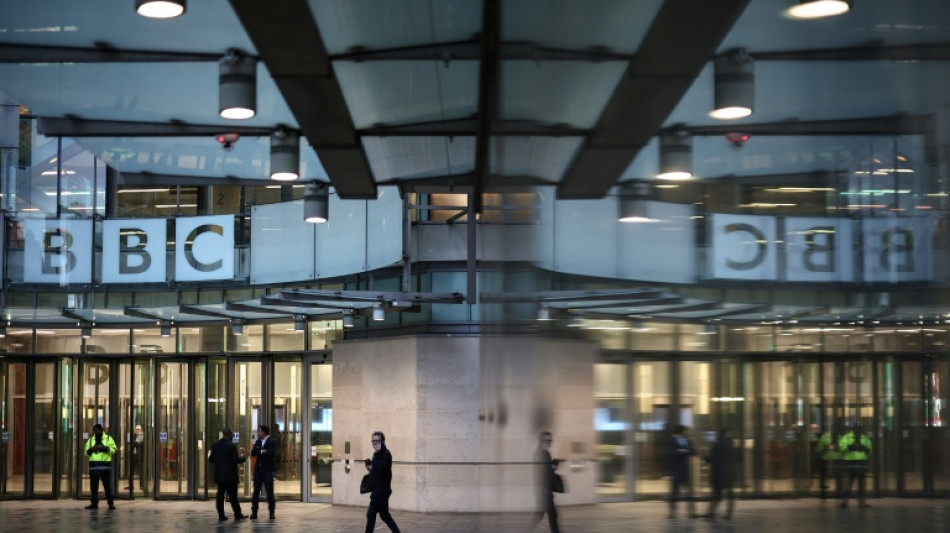

BBC grapples with response to Trump legal threat
The BBC's outgoing boss on Tuesday defended its journalists as the broadcaster grappled with how to respond to US President Donald Trump's threat of a lawsuit over a misleading speech edit.
Trump's lawyers on Monday gave the BBC until Friday to "appropriately compensate" the president for "harm caused" by a documentary containing the edit, or face a $1 billion lawsuit for damages.
The controversy has already seen the under-fire broadcaster apologise for giving the impression that Trump directly urged "violent action" just before the assault on the US Capitol by his supporters in 2021.
It has also claimed the jobs of two senior executives and lifted the lid on tensions at the top of the renowned institution over the coverage of hot-button issues, including the war in Gaza.
Director general Tim Davie, who resigned on Sunday, admitted the broadcaster had made "some mistakes that have cost us" but said "we've got to fight for our journalism".
"These times are difficult for the BBC, but we will get through it," Davie said, according to BBC News.
The BBC reported that Davie did not directly address Trump's legal threat in the meeting.
Meanwhile, Prime Minister Keir Starmer's spokesman on Tuesday said it was "not for the government to comment on any ongoing legal matters" related to the BBC.
Starmer had previously defended the BBC as having a "vital role in an age of disinformation". Culture Secretary Lisa Nandy is also set to make a statement in parliament about the row.
- Board divisions -
The BBC, which is funded by the British public, has faced growing accusations of bias from different ideological camps.
The latest crisis, which spiralled after the Daily Telegraph last week leaked a memo by former BBC advisor Michael Prescott, has also laid bare some of the divisions within the BBC and its board.
In his report, Prescott raised concerns about anti-Israel bias in the BBC's Arabic service, the coverage of the Gaza war, and the BBC's reporting on trans issues, among others.
In a public apology for the Trump speech edit, BBC chair Samir Shah on Monday said the broadcaster had taken steps to address other issues in Prescott's memo, vowing to reform oversight within the organisation.
Some current and former BBC journalists have blamed right-wing board members for leading the charge that the BBC is "institutionally biased" -- which outgoing BBC News CEO Deborah Turness denied.
However, Mark Urban, a former BBC editor and presenter, suggested in a blog that "culture wars" and liberal voices were also at fault for the lapses.
The BBC is due to renegotiate its Royal Charter, which outlines the corporation's governance and will end in 2027.
Davie said despite recent controversies -- which have sparked calls for changing the licence-fee funding model that the BBC depends on -- the broadcaster was in a "really good position to get a good charter".
- 'Prepared for all outcomes' -
Public callers told BBC Radio 5 on Tuesday they would refuse to pay the licence fee if "we have to pay a penny to Trump".
Trump has been accused of a hostile campaign to stifle US news and media organisations since returning to power in January.
The letter from his legal team said the edit in the BBC's flagship Panorama documentary programme gave a "false, defamatory, malicious, disparaging, and inflammatory" impression of what he said in his speech outside the White House.
A federal criminal case accusing Trump of seeking to overturn the results of the 2020 election that he lost to Joe Biden was dropped because of his November 2024 White House victory.
Trump's lawyers are threatening to sue the BBC in Florida. They would be too late to file a lawsuit in the UK, where there is generally a one-year time limit for bringing libel claims, given that the documentary was aired in the UK in October 2024.
But Trump would face other challenges. Media and defamation lawyer Matthew Gill told AFP the Panorama documentary would likely have had a "very small audience" in the United States, making it harder to prove harm caused to Trump.
BBC chair Shah told BBC News on Monday that the organisation was "considering how to reply" to Trump.
When asked about whether the legal threat could be real, Shah replied: "I do not know that yet, but he's a litigious fellow, so we should be prepared for all outcomes."
O.Moore--CT



